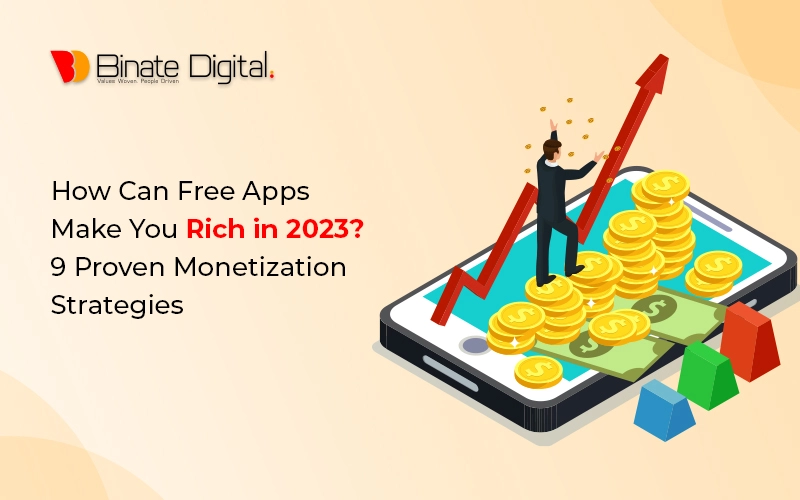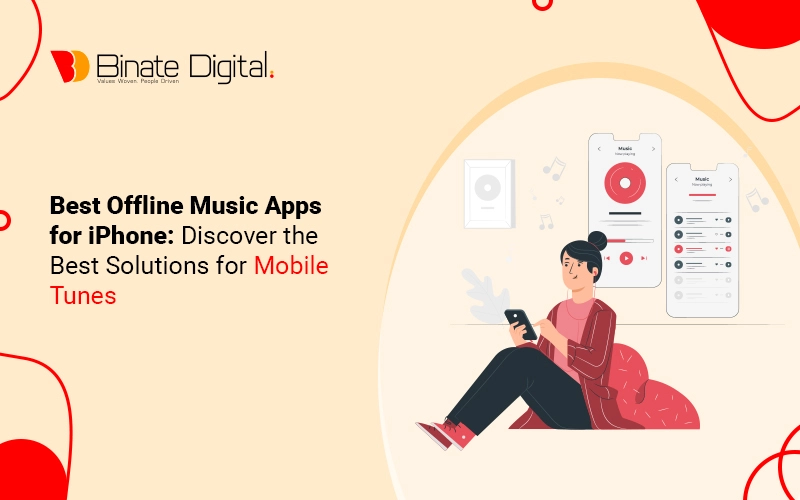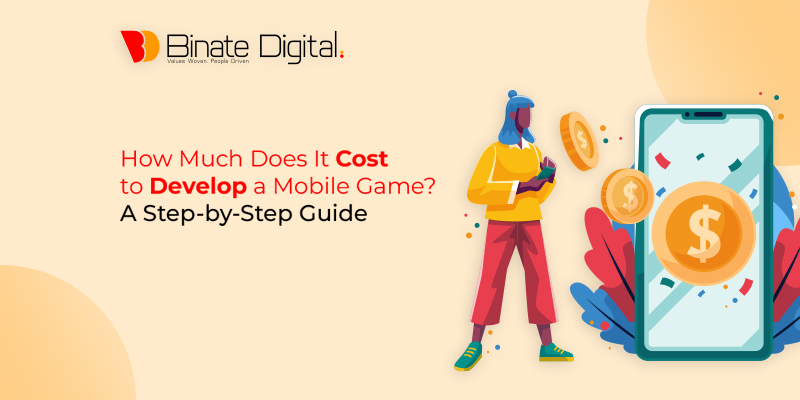Although developing free apps and selling them can be a successful business, it’s crucial to realize that there are better ways to become wealthy. Thus, the query we want to pose is: how free apps make money? Read on to learn how apps will make money in 2024. App developers will have many tested monetization techniques at their disposal in 2024. As time passes, the demand for free apps is at the top of the market compared to paid apps, which require user payment while downloading. In other words, it only stops a user from installing a free app if it needs to be downloaded from questionable sources. This allows it to be downloaded arbitrarily, used once, and closed forever. As a result, the key to this kind of app is user retention rather than user acquisition. The following nine tactics will enable you to monetize free apps:
On this Article
In-App Advertising:
Including advertisements in your app might be a dependable way to make money. You can show banners, interstitial advertisements, or native ads to your users through ad networks like Google AdMob, Facebook Audience Network, or in-house advertising. You can make more money from advertisements if your app has more users.
In-App Purchase:
Offering more material, features, or virtual products for sale inside your game is what in-app purchases (IAPs) do. Freemium business models are widely used, in which users can download apps for free but can purchase updates. Consider games that offer content packs or in-app purchases. Because of digital money, game companies typically employ this paradigm. As a matter of fact, over half of the games offer multiple game currencies, including coins, gold, and gems. These in-app purchases largely influence app downloads. This is a clever strategy for gradually converting free software users into paying ones without being overly invasive. However, to get consumers to continue paying, you must keep them interested in your free mobile apps.
Subscriptions:
Using a subscription model, you can provide premium services or content. To access exclusive features or materials, users must pay a monthly fee. This works well for apps offering continuous value, such as productivity, entertainment, or news. Most free app publishers employ the well-liked and typical strategy of providing a free trial period before charging a subscription price to users who want to keep accessing the app’s content.
Affiliate Marketing:
Collaborate with companies to advertise their goods or services in your application. Every sale or activity that comes from your app earns you a commission. Verify that the goods and services fit your app’s target market and subject. App publishers can promote or sell affiliates’ products or services based on the number of clicks or installs. You can use pop-up ads to promote someone else’s app or advertise products. All you have to do is place advertisements within their mobile application or choose affiliate marketing, where you receive payment from independent ad networks.
Furthermore, advertising is the best approach to monetizing apps. You only need to display your ads within the mobile application to earn money from third-party networks and advertisements. App owners are often compensated when a user clicks on an advertisement, hits the ad, or installs the application after seeing an advertisement.
Partnerships and Sponsorships:
Work with companies to use your app to advertise their goods and services. This can include co-branded marketing, special offers, or sponsored content. Deals for sponsorships can be a big source of income. Most free app publishers employ the well-liked and typical strategy of providing a free trial period before charging a subscription price to users who want to keep accessing the app’s content.
Data Monetization:
You can sell user data to relevant businesses if your app gathers valuable user data in compliance with privacy standards. Make sure you have users’ consent and disclose this to them. Making money using the data your software gathers is known as “data monetization.” Numerous apps collect user data, which can be useful if handled sensibly and morally. Recall that using data ethically and responsibly helps you preserve consumer trust and brand reputation in addition to being required by law. Think about the moral ramifications of your usage and monetization of user data.
Crowdfunding:
You can profit from users who value your software through platforms like Patreon or Kickstarter. Users can earn special perks and contribute to your project to keep it free for others. By determining potential customers’ interest in your app idea, crowdfunding might be a useful source of money. Success is only assured if it takes much work and promotion. Maintaining transparency and accountability with your supporters at every undertaking stage is imperative.
Sell Your App:
You can initially offer a free version with limited features and a premium edition with more sophisticated capabilities, even though your app might not be completely free. You can draw in more visitors this way and still make money from paying members. App sales can be a lucrative method to realize the value you’ve put into your work but to ensure the sale goes properly and without a hitch, you need to be organized and follow a set procedure. Optimizing the process and increasing your app’s sales potential can also be accomplished by working with app marketplaces or consulting specialists in in-app sales.
Cross-Promotion:
You can advertise your new apps in your portfolio if you have more than one. By doing this, you may increase interaction and downloads without depending on outside advertising. You can enhance user engagement and magnify the downloading of apps by promoting your app or product, which is why you make money. Introducing your audience to related apps or items can enhance user engagement, increase app downloads, and make more money. When used properly, it’s a strategic approach that works for you and your partners. It can benefit you and your partner when the promotion is done successfully.
How to pick the best approach for monetization
Only some apps are suited for some monetization techniques. Before selecting your monetization models, think about the following points:
Remember the app kind
Make sure you comprehend the type of your mobile application completely. What’s the process of usage? How can it identify the issue? Once you have solid knowledge, you can dispatch the strategies you want to use in the app. For example, consider a subscription model if you have a service app or provide content to your users. Nevertheless, something other than this business model will work for an e-commerce platform.
Watch who is competing with you
By researching your competition, you may choose which monetization strategy is best for your app. You can select a strategy that works for your competitors and will work for you. You may also discover a weakness that works in your favor. Yes, this is among the easiest methods to implement. The most important point is to gather all the revenue streams of your competitors on the Google Play and App Store. You need to apply all these strategies to find which is best for your app.
Find out about your target market
The type of monetization strategy you should test on Google Play and the App Store can be determined in part by understanding the demographics, behaviors, and other preferences of your users. How do you know about your users? What’s required of them? To what extent would they be prepared to pay? These are only a handful of the inquiries about your users that you ought to be able to respond to. You can increase the revenue from your free app by offering your target audience actual value.
Think about hybrid approaches
Numerous well-known apps don’t rely solely on one revenue stream. Many need help since using multiple strategies typically results in insufficient revenue to provide a healthy return. The options for hybrid tactics are virtually limitless. For instance, a freemium app may provide in-app purchases, premium content, and advertisements in the free edition. The same app might even license users’ data to interested parties and notify them via text or email.
How free apps make money without ads
You have alternative options, even if it might appear like ads are the best way to make money. For instance, you may charge your users a one-time fee or a subscription for an extra service. You can get paid to play mobile games by doing $1–$5 microtransactions. Consumers pay for incentives that improve their gaming experiences. You may determine where the app owners receive their revenue by multiplying the cost of in-app purchases by the total number of users. Another illustration would be dating applications like Tinder, where users must pay to access premium features developed by app creators. Some even provide seasonal packages with other extras like icons or stickers. According to research, mobile games are the most successful app category in income generation since they provide a solution to how free mobile games generate revenue.
How is it possible to make money with free social apps?
- Most of those in your immediate vicinity use one or more social media apps daily. The subject of how free apps like Facebook generate revenue would come up, given that the majority of them are available for free and don’t charge for any essential functionality.
- There are numerous ways for an app offered for free to generate revenue. Generally speaking, you are the payment when you aren’t paying for an app. Social networking applications pay you for your time and attention in exchange for a portion that goes to marketers.
- Furthermore, a few social media apps gather and sell your personal information to various businesses. This lets organizations modify and customize their product to match your demands, even though it may initially seem immoral. Additionally, you can choose what kind and how much information you wish to share with the social media app you use.
What distinguishes paid from free apps?
- Every desktop app store, as well as every mobile app store, has two main kinds of applications. Both premium and free apps are available.
- As the name suggests, free apps are those that users or customers can download and install for free because there is no fee associated with conducting a Salesforce security evaluation.
- To put it plainly, users of free apps encounter neither download thresholds nor other obstacles.
- An app’s free or paid version is a major factor in determining how to monetize it. Paid apps, however, operate differently.
- Since the license is entirely under the authority of the app owner, the user or customer will need to pay for the license and download and install the app via a payment processor platform.
- Paid apps come with guaranteed app earnings after the download.
- The topic of how much money applications make per download arises with these kinds of apps.
- Apps should take accessibility into account if they want to generate money.
- Paid apps offer restricted monetization alternatives through monthly and annual subscriptions; in contrast, free apps provide many revenue opportunities.
What is the price of developing an app?
The cost of creating an app can differ significantly based on several variables, such as complexity, features, platform, design, the development team’s location, and more. The cost of developing an app is not set in stone or uniform. Working with experts, such as a software development business, is still preferred, even when discussing simpler programs. You need to go through a well-settled process of developing an app while working with professionals and getting their assistance at every stage, from concept to app launch. Depending on the app’s kind and complexity, app development costs might vary greatly. The following three major app categories have approximate price ranges:
- The market value of the Common App ranges from $5000 to $100,000
- The market value of the Multiplex app ranges from $20,000 to $100,000
- The market value of the Advance app ranges from $100,000 to $10,00,000
Essential factors to consider before hiring a mobile app development company
Application developers create mobile apps for Windows, Android, and Apple operating systems, testing and releasing updates as needed. Matching mobile app development services with project needs is crucial. Evaluate app goals, target market, and features with a development partner for a successful release. Would you like to make money? How do apps make money? And wish to start a business developing mobile apps? To ensure a profitable and successful app, thoroughly assess your app’s objectives, target market, and necessary features with your development partner. The following are some other features and services that a company that develops mobile apps might provide:
Services Provided
Cross-platform, web, native, and UI/UX design, app maintenance, and more services are provided by many companies. It depends on you to select which is best for your project and will meet your business needs.
Experience And Expertise
Search for businesses with a proven track record and in-depth knowledge of your sector or the kind of app you hope to create. To evaluate their experience, look through their references from clients and portfolios.
Platform Expertise
Verify that the business has created apps for the platforms you wish to target, such as iOS and Android.
Technologies And Tools
Find out what tools and technologies the business employs to develop apps. This covers development environments and programming languages (Kotlin, Swift, React Native, Flutter, etc.).
Design Proficiency
User-friendly applications require excellent design. Consider the company’s UI/UX design capabilities; the success of an app depends on its usability and aesthetics.
Project Management
Timely and cost-effective app delivery depends on efficient project management. Inquire about the methods for managing projects.
Testing And Quality Assurance
To guarantee the app is flawless and error-free, ensure the developer adheres to strict testing and quality assurance procedures.
Client References And Reviews
Read client references and reviews to learn more about a company’s reputation and customer satisfaction.
Cost And Pricing Models
Discuss your spending plan and familiarize yourself with the company’s pricing structures. While some businesses may offer fixed-priced projects, others may bill hourly.
Communication And Support
A project’s success depends on effective communication. Keep in mind that your business has a strong communication system.
Legal And Logical Property
Discuss and decide who can own the source code, apps, and other logical property rights. Ensure that a precise contract is in place.
Updating And Maintenance
Find out about post-launch services, such as continuing assistance, updates, and upkeep for the app.
Timeline And Deadlines
Talk about the project’s anticipated timeline and ensure it fits your objectives.
Security And Privacy
Mobile app developers should prioritize user privacy and app security. Make sure they adhere to best practices in this context.
Wrap-Up
You can benefit in every specific way by monetizing if you have an app. Fortunately, BinateDigital makes your work as an app owner simple. When selecting a monetization strategy for your app, it’s critical to consider the niche, target market, and value it offers customers.
Furthermore, consider user input and modify your approach as necessary. Establishing a user base and maintaining their interest with frequent updates and enhancements are essential to your app’s success. A thorough understanding of your market, time, and commitment are frequently necessary for success in the app industry. It is crucial to conduct extensive research and due diligence before selecting a mobile app development company. Find the ideal partner to help you develop your app idea into a profitable and user-friendly mobile application by comparing several options, requesting proposals, and posing thorough questions. To put it briefly, this is one of the nine free monetization tactics you can use.







